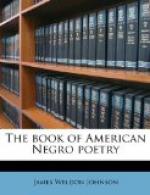“Ah! I abhor his protest
and complaint!
His pious looks and patience
I despise!
He can’t evade the test,
disguised as saint;
The manly voice of freedom
bids him rise,
And shake himself before Philistine
eyes!
And, like a lion roused, no
sooner than
A foe dare come, play all
his energies,
And court the fray with fury
if he can;
For hell itself respects a
fearless, manly man.”
It may be said that none of these poets strike a deep native strain or sound a distinctively original note, either in matter or form. That is true; but the same thing may be said of all the American poets down to the writers of the present generation, with the exception of Poe and Walt Whitman. The thing in which these black poets are mostly excelled by their contemporaries is mere technique.
Paul Laurence Dunbar stands out as the first poet from the Negro race in the United States to show a combined mastery over poetic material and poetic technique, to reveal innate literary distinction in what he wrote, and to maintain a high level of performance. He was the first to rise to a height from which he could take a perspective view of his own race. He was the first to see objectively its humor, its superstitions, its shortcomings; the first to feel sympathetically its heart-wounds, its yearnings, its aspirations, and to voice them all in a purely literary form.
Dunbar’s fame rests chiefly on his poems in Negro dialect. This appraisal of him is, no doubt, fair; for in these dialect poems he not only carried his art to the highest point of perfection, but he made a contribution to American literature unlike what any one else had made, a contribution which, perhaps, no one else could have made. Of course, Negro dialect poetry was written before Dunbar wrote, most of it by white writers; but the fact stands out that Dunbar was the first to use it as a medium for the true interpretation of Negro character and psychology. And, yet, dialect poetry does not constitute the whole or even the bulk of Dunbar’s work. In addition to a large number of poems of a very high order done in literary English, he was the author of four novels and several volumes of short stories.
Indeed, Dunbar did not begin his career as a writer of dialect. I may be pardoned for introducing here a bit of reminiscence. My personal friendship with Paul Dunbar began before he had achieved recognition, and continued to be close until his death. When I first met him he had published a thin volume, “Oak and Ivy,” which was being sold chiefly through his own efforts. “Oak and Ivy” showed no distinctive Negro influence, but rather the influence of James Whitcomb Riley. At this time Paul and I were together every day for several months. He talked to me a great deal about his hopes and ambitions. In these talks he revealed that he had reached a realization of the possibilities of poetry in the dialect, together




